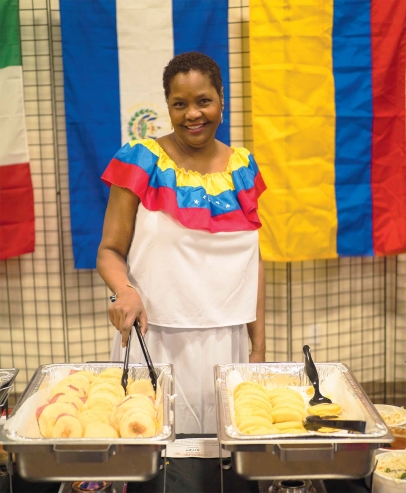THINK GLOBALLY, EAT LOCALLY - The International Marketplace Coalition’s circle of impact
Driving down the long stretch of 38th Street in the Lafayette Square area, you’ll notice sights that are quite different from other parts of Indianapolis. The street is bordered by strip malls with small storefronts featuring names like Ginza, Jiallo’s, La Guanaquita and Al-Rayan. As you near these restaurants, you are greeted by the smells of curry and spicy coriander from India Palace and hints of chilies and spices from the South American markets. This long thoroughfare and its surrounding streets look less like a Midwest city and more like a mini United Nations. And that’s exactly what the International Marketplace Coalition (IMC) set out to create.
The IMC was established in 2010 to turn Lafayette Square into a vibrant, diverse and international corridor, giving both locals and visitors the opportunity to experience and learn about other cultures. Through festivals and events, lunch tours, parades and more than 80 ethnic restaurants, over 40 international grocery stores and well over 800 ethnic businesses that belong to the international corridor, IMC has changed the culture of the Lafayette Square neighborhood. The businesses are benefiting from sales, which in turn, provides economic development to the area. And Mary Clark, executive director of the IMC, believes this is a direct result of all the diverse organizations working together to better their community.
“There’s a saying that goes, ‘Rising tides lift all boats,’” says Clark. “This organization is working to lift up everyone and they believe that. That’s why we all work together. Nowhere else in the city are businesses getting as much national attention,” says Clark. “We have people coming here saying they saw us online and it landed them here in the International Marketplace area. I meet people from other states and cities every day.”
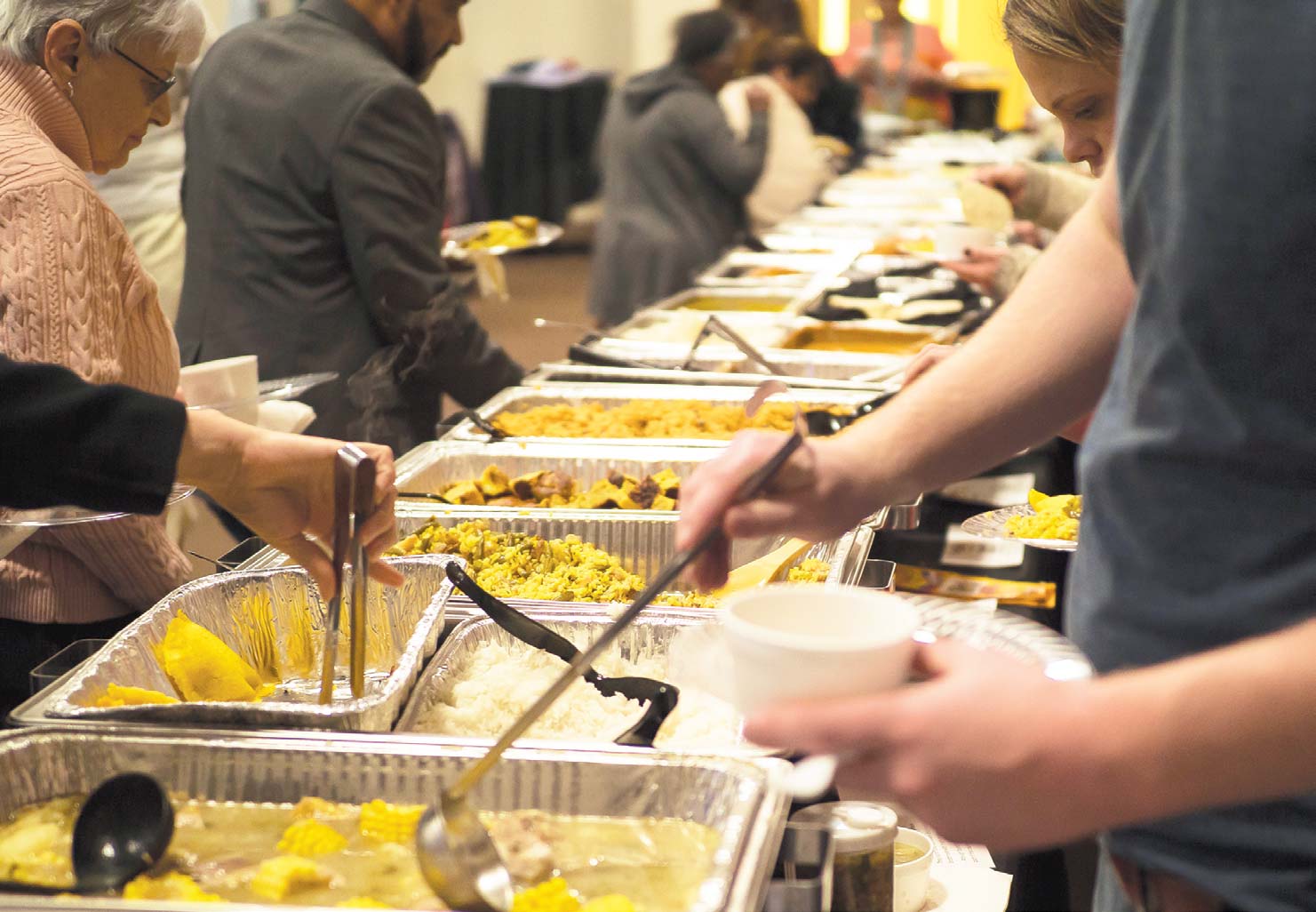
THE RISE OF ONE
If there’s one business that exemplifies the mutually beneficial relationship between IMC and the community, it’s Al-Rayan. Hints of garlic, allspice, pepper, coriander and cumin mix together to greet visitors when they walk into this Yemeni restaurant that specializes in Middle Eastern and Mediterranean cuisine.
Founded by Abdulwahab Abashaar, Al-Rayan is 100% halal, which means the food is prepared according to Muslim law. Photographs and artwork depicting the Middle East are hung throughout the restaurant, giving guests the feeling they’re far removed from Indianapolis. The maroon and brown hues invite guests to sit at one of the many available tables, or booth spaces that are cordoned off with curtains to give diners an intimate eating experience. The individual booths allow customers to sit on a rug on the floor to eat in the traditional Yemeni style of dining.
“Our tradition is, when you sit down to have a meal, you have respect for food and family; so you sit on the floor and gather and talk,” says Mahammad Abashaar, Abdulwahab’s son and chef and manager of Al-Rayan. Abashaar has seen many customers embrace the traditional Yemeni way of dining so fully that they never elect to sit at a table again.
Al-Rayan’s menu includes traditional Yemeni dishes and Middle Eastern favorites. Fresh hummus is made daily, and adorned with chopped parsley and olive oil is a favorite appetizer served along side a basket of warm naan bread. Lamb shawarma comes to the table sizzling from the grill and is plated with a mix of white jasmine and yellow spiced Yemeni rice, and fresh cut tomatoes. Spicy Lebanese-style Kofta kabobs are also a favorite among guests.
Mandi chicken and rice, Al-Rayan’s signature dish, is in a class by itself. Mandi is a dish originated from Hadhramaut, Yemen. The whole chicken is seasoned with baharat, a traditional Middle Eastern spice mix that often includes allspice, black pepper, cardamom, cloves, coriander, cumin, nutmeg, turmeric, saffron, ginger and paprika. The chicken is then suspended in the air and cooked by the steam and heat from a clay oven or brick “pit” underneath. The meat is roasted to a golden color and fork-tender consistency, and served steaming hot alongside Yemeni rice.
Abdulwahab Abashaar was eager to bring the tastes and traditions of Yemen to Indianapolis after falling in love with his adopted home country. He emigrated from Yemen to Michigan in 1998 and moved to Indianapolis in 2014. He initially came to the United States seeking medical treatments, but soon found himself so enamored with his new country that he never entertained the idea of returning home. According to Mahammad Abashaar, the International Marketplace community provided his father the opportunity to start his own business.
“My father wanted to open a traditional Yemeni restaurant, but he wanted it to be unique in the community,” says Mahammad Abashaar. “There is a large Yemeni community in Michigan so there would have been a lot of competition if he stayed there. But here in Indiana, he is the only one in this area and the business has been successful because of that.”
When the Abashaar family first opened Al-Rayan, it was a small space that eventually had to expand to meet the needs of its growing customer base. The family soon expanded the restaurant to include a bakery and an event hall that hosts weddings and parties for up to 150 people.
“People love to have their events here because we do all the work,” says Abashaar. “We provide the space, food, drinks and decorations.” Mahammad Abashaar hosted his own engagement party at the Rayan banquet hall.
He is quick to point out that Rayan owes much of it success to its partnership with the IMC.
“Before IMC, people did not know who we are and what food we served,” he says. “Mary helps bring people to Al-Rayan so they learn about Middle Eastern cuisine and want to try it. And once they come and try it, they keep coming back because they love the food.” Abashaar loves living in Lafayette Square and sees how the community benefits from IMC’s involvement. Clark sees Al-Rayan’s collaboration with IMC as a success story.
“This area is what it is because of the people that call this neighborhood home,” says Clark. “At the end of the day, we are shrinking the globe and creating a village.”
International Marketplace Coalition: IMCoalition.org
Al-Rayan Restaurant
4873 W. 38th St.
Indianapolis, IN 46254
317.986.7554
AlRayanRestaurant.com
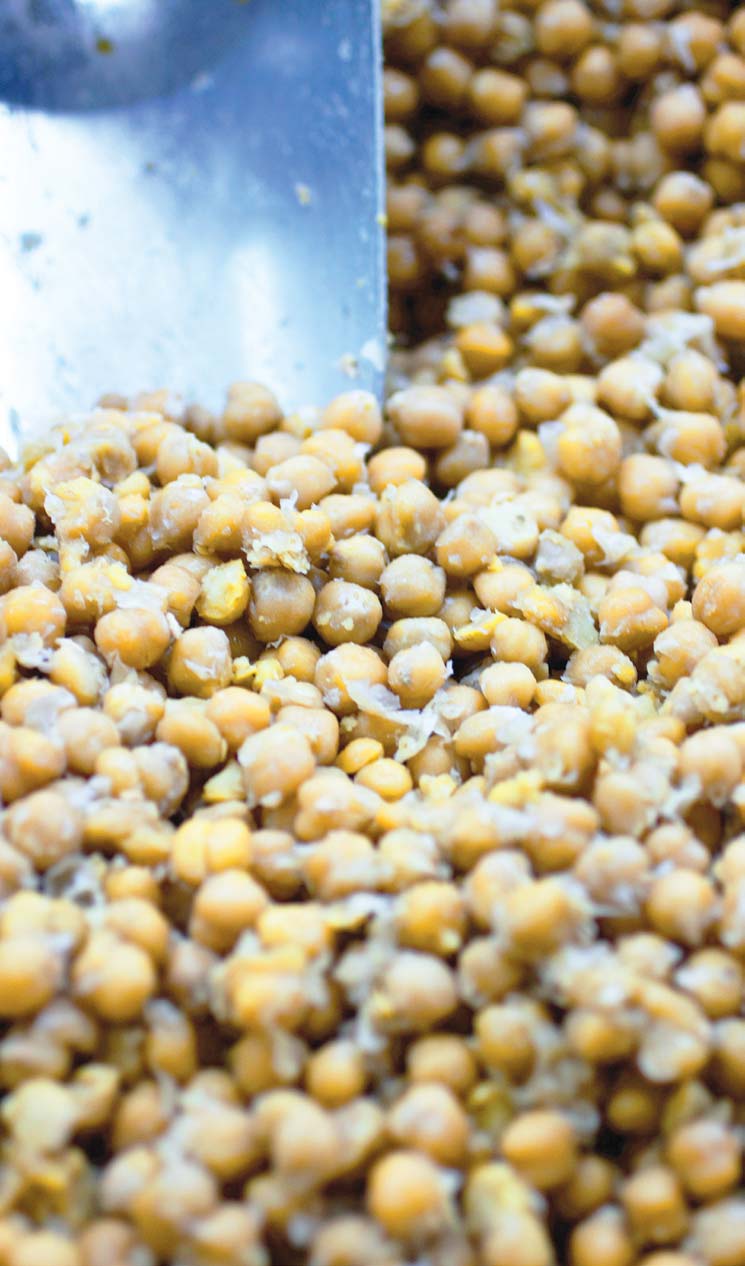
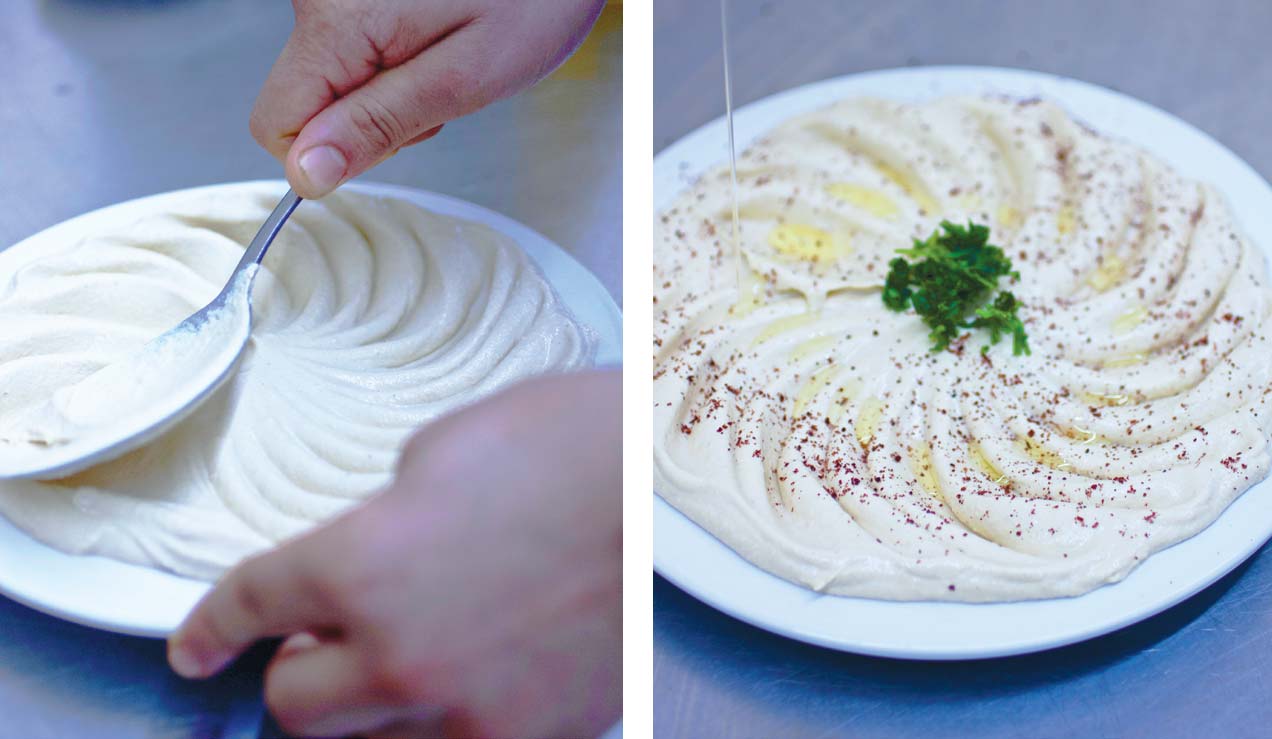
From Lafayette Square to the International Marketplace: The Revolution of a Community
The Lafayette Square area community on the northwest side of Indianapolis has not always had the best reputation. Inflated rumors of high crime rates, the abandonment of big box retail stores and the multiple closures within the Lafayette Square Mall plagued the urban neighborhood’s image. But that all changed when the International Marketplace Coalition (IMC) was formed and began working together with traditional and new ethnic businesses to transform the community. Those partnerships created a newly branded area for the city of Indianapolis now known for its international cuisine, culture and diverse community.
At the time so many traditional businesses were leaving the area, Mary Clark, executive director of the IMC, began seeing several immigrant communities coming into the Lafayette Square area and establishing businesses. Clark cites ease of access and affordability as the main reasons for families and other immigrants to start businesses. Soon ethnic grocery stores began popping up, as well as a Latino furniture shop and a cobbler. It quickly became apparent that the neighborhood was becoming an international mecca with ethnic restaurants and markets opening.
The IMC hosts numerous events and festivals to bring awareness of its community of restaurants and stores. One of the largest is the Taste the Difference Festival in September, which features local restaurants sampling their cuisine to festival attendees. Now in its 13th year, this year’s festival will include 30 restaurants and expects to have around 2,000 guests. IMC also hosts monthly lunch tours in which nearly 40 attendees from all over the city are invited to experience and taste the new cuisines that are now part of Indianapolis and learn about the history and culture of the establishments. The IMC also hosts the “Dine in at the Global Village” series. A recent event in the series, “Love with the Ibero Americas,” featured more than 20 authentic Latin and Spanish dishes as well as traditional dance and singing from the Americas.
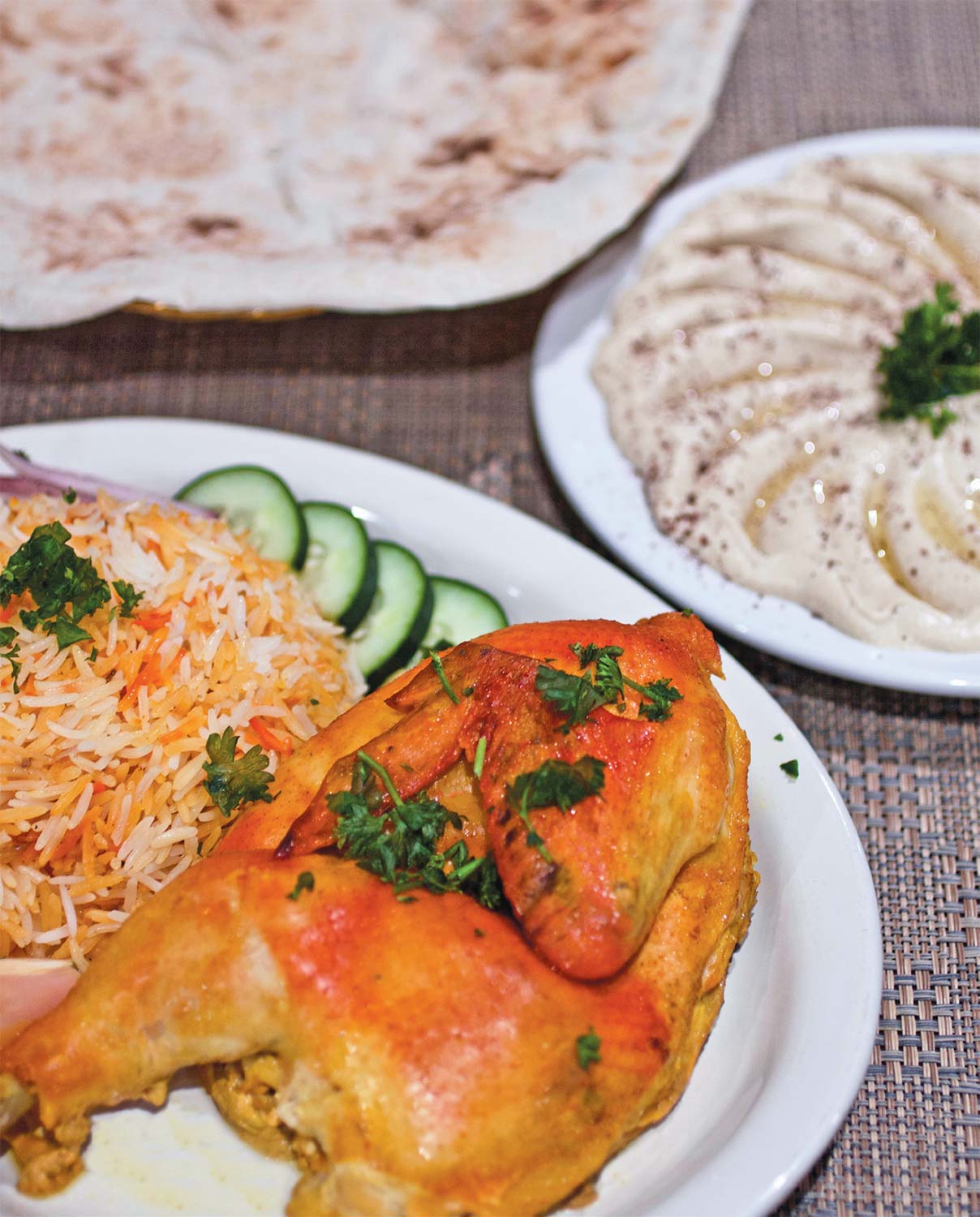
A Taste of the International Marketplace Coalition
The International Marketplace Coalition includes 80 ethnic restaurants and 40 international grocery stores. These six restaurants are pioneers in International Marketplace for their community involvement and for being long-standing businesses.
ABYSSINIA ETHIOPIAN RESTAURANT
Cuisine: Ethiopian
5352 W. 38th St.
317.299.0608
HAVANA CAFÉ
Cuisine: Cuban
3839 Moller Rd.
317.293.2822
GINZA JAPANESE STEAKHOUSE
Cuisine: Japanese
5380 W. 38th St.
317.298.3838
INDIA PALACE
Cuisine: Indian
4213 Lafayette Rd.
317.298.0773
MACHU PICCHU
Cuisine: Peruvian
5356 W. 38th St.
317.388.8696
PASTELERIA GRESIL BAKERY
Cuisine: Mexican
5348 W. 38th St.
317.299.8801


